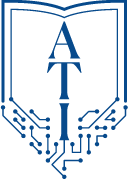“Tis the good reader that makes the good book; in every book he finds passages which seem confidences or asides hidden from all else and unmistakenly meant for his ear; the profit of books is according to the sensibility of the reader; the profoundest thought or passion sleeps as in a mine, until it is discovered by an equal mind and heart.”
Ralph Waldo Emerson
At ATI, we love readers.
We love the people who get lost in a book – who cry with imaginary characters as they dream and fight and learn to fly. And we love helping our students become readers, because we believe that literature is a key element of a life well lived.
All children- all people- are somewhere in the process of self-creation. But in middle and high school, that process, which previously has been subconscious, becomes explicit. Unlike the toddler who creates herself without realizing it, a teenager needs to consciously choose the values she’ll uphold, the models she’ll emulate, the issues she’ll care about, the life she will lead. Art- and in particular literature- is a profoundly powerful tool for advancing that work.
A study of literature allows students to “try on” different lives and different perspectives. It provides examples of moral decision-making exemplified in specific characters and situations, and gives students the chance to consider their own character and decision-making in as-of-yet unencountered circumstances. Literature provides rich and varied examples of individuals in society, in a way that can inform the decisions students make about their own roles and relationships. It promotes perspective-taking, and an understanding of others. It enables students to recognize and connect with the universals of human experience.
Fundamentally, a study of literature is a study of the world: bigger, more complicated, and more diverse than we have yet seen it with our own eyes. The world of fiction can make real the struggles of someone a thousand miles or a thousand years away, and can challenge conclusions, inspire compassion, and ignite dreams. We teach literature as the learning material for human life. A shared immersion in literature allows our students to engage with one another, debate, and reflect on what matters to them and the lives they wish to live.
So how do we teach literature?
The first principle of literature at ATI is: students read first as readers. Literature courses can often focus on the “how” of texts, treating the piece as a mentor text for writing skills: “How did the author structure these chapters? How did the author employ metaphor to convey a message here?” In contrast, reading as readers first allows students to become completely immersed in the world of the story, to feel its questions and decision points as real, immediate, and consequential. The mechanics and techniques of writing come into consideration later, but the first job of a literature course is to help students love reading.
We also include literature in classes on history - reading the stories, songs, or poems of the heroes through the ages. We include it in mathematics - a class in Toronto is determined to emulate Sherlock Holmes’s use of the theorem of similar triangles to prove that they, too, could solve the mystery of the Musgrave Ritual. Literature makes tangible the value of knowledge in a multitude of fields, and we create and encourage integrations between literature and other subjects.
A key element of our literature curriculum is the novel study, where a small group of students will engage deeply with a specific text. The study may involve other short stories, essays, or poems brought in as comparison or companion material. The group engages in Socratic discussion circles, writes regular journal entries, and explores the narrative elements of the book through creative and written expression. Each of these routines strengthens a student’s ability to develop and defend a hypothesis about the work, with reference to specific textual evidence. Throughout all of these educational methods there is an emphasis on application: applying what is learned from the book to other texts, other subjects, historical events, present-day contexts, and a student’s own life and values.
Here at ATI, we love reading, and we love readers, and most of all, we love sharing that love of reading with new students!
We’re just kicking off the 2022-23 school year, and that means new novel studies. Here are some of the books our middle school students are reading this week. What are you reading this week?
Laura Mazer is the SVP of Programs at Higher Ground Education, where she enjoys thinking about the scope and sequence of the universe.

